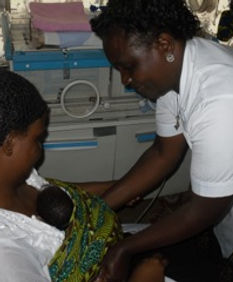Prevention of Mother to Child Transmission (PMTCT)
The purpose of this programme is to reduce the transmission of HIV virus from infected mothers to their babies. Our nurses counsel mothers and then ensure that they and their babies are given the appropriate advice and medicines until they have finished breast-feeding, after which transmission from mother to baby is no longer a risk. Any babies infected with HIV then receive early treatment. A support group for parents helps with the emotional impact of living with this disease.
The PMTCT projects:
-
Provide the opportunity to prevent infection.
-
Provide the opportunity to identify and provide care for HIV exposed and infected children and their mothers/families
In 2015, 117 babies were registered on the programme and the transmission rate was <1% (7.2% in 2012). In 2011, we employed two new nurses to extend the PMTCT programme to a clinic in Nkwen, another area of Bamenda, where babies of HIV mothers were not getting the care they needed. We also started a parent support group in the Nkwen area, and trained community workers to raise awareness of the service.
MCAI is pleased to announce that there is now a robust system for early infant diagnosis and care, which was not present before the programme.
Thanks to funding from ViiV Healthcare's Positive Action for Children Fund (PACF), MCAI has widened access to and improved follow-up of PMTCT services in the Nkwen area of Bamenda, North West Province of Cameroon.

Very many thanks to the Mercury Phoenix Trust for their loyal support over the years for our work in Cameroon with mothers and babies with HIV infection.
Neonatal Course 2014-2015

MCAI and our partner organisation ALSG taught Neonatal Care Courses in Bamenda, North West Region of Cameroon in October 2014 and November 2015. 37 neonatal nurses and midwives took part in the courses, which included workshops and practical skill stations, and were specially designed to enhance the skills of nurses working with newborn babies in low- income settings.
The course participants were enthusiastic and performed well in their assessments. At the end of the course, each was presented with some items to help them in their work – a bag and mask for resuscitation of newborn babies, a stethoscope, thermometer and nurses watch.

Neonatal Course 2014: Participants pictured above with their new bags of equipment
Dr Alison Earley talks PMTCT Nkwen
Play nurse for children in hospital in Cameroon
In 2013, Play Specialist Sally Hitchings travelled to Cameroon for MCAI and began work towards creating a play area near the children's ward and providing toys, fun and interaction, so the children are distracted from their surroundings and treatments. Simple toys like a ball and some bubbles can give delight to the children and reduce the trauma of distressing procedures and treatments.
A dedicated play nurse can provide distraction and play for children who are ill in hospital and encourage attendance for chronically ill children who are outpatients.
Hospital treatment can be distressing for children, who do not understand why they must wait for long periods and undergo painful procedures.
In the UK it is taken for granted that children in hospital will have access to toys and play specialists, but this is a completely new concept in many low income countries, including Cameroon.
Here, sick children appear sad, depressed and listless. HIV infected children, who must attend clinics frequently for blood tests etc, are particularly affected.
Play Specialist Gemma Jackson volunteered in 2014 at Bamenda Hospital, carrying on the valuable work started by Sally in October 2013.
Play nurse Evodia continues to support children in the playroom, and attendance rates of HIV positive children have improved.
“All children like toys, we thank you for creating this project, and providing to them the toys for their age.
This play room has come a long way to relieve the heavy burden in the hearts of some children. At times they come sad but at the end of their stay in the unit they go happy.”
Read a report written by Gemma Jackson for the newspaper at Wycombe Hospital.

Play Specialist Sally Hitchings using distraction techniques in Cameroon


"This is Evodia the Play Nurse stood beside the cupboard in the playroom looking at the new toys donated.
I worked alongside Evodia who was incredibly enthusiastic about play and how it helps children in hospital. We discussed new strategies to promote the playroom and play facilities. These included informing the parents during clinic times that the playroom is open and providing play for all the children in the hospital by taking toys to the ward for those children who stayed in hospital long or short term. These strategies ensured all the children were able to access play within the hospital grounds. This was important as play in hospital has been proven to relieve stress and help develop coping mechanisms, Hubbuck (2009) , Play in Hospital"
Gemma Jackson, Play Specialist

Some of the items Sally and Gemma took taken out to Cameroon
A Nurse's Story
One of MCAI's nurses, working with the PMTCT team at the Regional Hospital Bamenda, sent us a story about one of the mothers that she has counseled. This illustrates many of the problems affecting women in Cameroon - poverty, poor access to education, ignorance regarding HIV, and stigma – all remain common. Read the story here.

